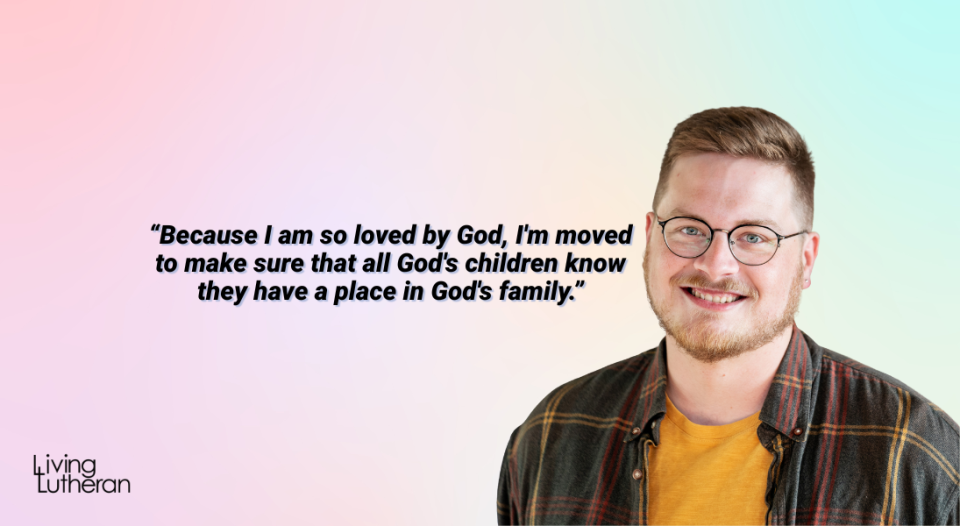Erik Nelson’s hope for the church comes from his work as the St. Paul outreach intern at Lutheran Campus Ministry-Twin Cities. During his three years there while attending seminary, Nelson (he/him) witnessed young adults being drawn to a community where they could study Scripture, receive the sacraments and experience God’s unconditional love. Nelson spoke with Living Lutheran about the power of that witness and the church’s unique opportunity to be a place where everyone can belong and be fully themselves.
Living Lutheran: How are you connected to the ELCA?
Nelson: I’m a member of Grace Lutheran Church of Northeast Minneapolis and a third-year Master of Divinity student at Luther Seminary. I’m a word and sacrament ordination candidate in the Minneapolis Area Synod as well.
I came to the ELCA in college, after growing up in another Lutheran denomination. I was 12 when the ELCA voted in 2009 to ordain openly queer people. From a very early age, the two things I knew were true about myself were that God loved me very much and that I was gay. In my heart, I knew that God loves everybody, no exceptions, and it meant the world to me to see the ELCA making such a public welcome for people like me.
The church I was growing up in preached fiercely against the ELCA for making this choice, but to me, it was the most Christlike thing a church could do. As I heard people gleefully telling stories of congregations and members leaving the ELCA, I saw a church that had taken up its cross to make space for queer people to feel loved and accepted as part of God’s family.
When I got into college, I ended up at an evangelical college where I would have been expelled if they knew I was gay. I found a refuge in Grace Lutheran Church of Northeast Minneapolis, whose members embraced me with open arms. Because of the welcome the ELCA declared in 2009 and the welcome I received from my congregation, I’m now in seminary, about to go on internship, grateful for the opportunities I have now to extend the welcome that I once received.
Is there a story, passage or person in Scripture that encourages you to live fully and authentically?
I really resonate with the story of the Ethiopian eunuch in Acts 8. This was a person who would have been excluded and disregarded by some because they didn’t fit into the neat and tidy boxes that we try to put on gender and sexuality. After Philip shared the gospel with them, they said, “What would keep me from being baptized?” This is a really loaded question. There are many reasons why Philip could have turned them down for baptism and just gone away. But Philip knew that God’s love is for all people, and he baptized them. After that, tradition tells us that the eunuch returned home to Ethiopia, and their witness to the good news of Jesus Christ became the seed for one of the oldest churches in the world today.
The gospel of Jesus Christ calls us to many places and people that society would otherwise tell us to walk away from. Because I have been welcomed like the eunuch, my life has been transformed like theirs, and I’m called to share the good news of Jesus Christ as well.
What does it look like to live authentically as both LGBTQIA+ and Lutheran?
One of my pastoral mentors, Pastor Kate Reuer Welton, often says in her sermons something like, “Before and beyond anything you do or don’t do, you are loved by God.” I think this sums up a big part of being a queer Lutheran. Our Lutheran emphasis on justification by grace through faith reminds us that our belovedness is not dependent on anything we do or any part of our identities. God loves us because God loves us.
There are many people who want to speak for Christ and put conditions and strict boundaries on God’s love. Queer identities remind us that binaries and borders are much more hazy than we think they are. God’s love claims us before and beyond anything we do or don’t do, before and beyond any labels society puts on us or any boxes that people try to trap us inside.
Being a queer Lutheran is an important part of my identity, but the most significant part of my identity is my belovedness by God. And because I am so loved by God, I’m moved to make sure that all God’s children know they have a place in God’s family. Just as our understanding of gender and sexual identities are always growing, our vision of the universal scale of God’s kingdom is ever expanding.
What advice would you give to congregations or pastors who want to create more inclusive worship experiences for LGBTQIA+ people?
Be ready for things to change. When we say we want people to feel welcome in our churches, do we mean we just want them to fill our pews or do we want them to really be part of our family? When someone belongs as a member of the family, they’re welcome to change the carpet or rearrange the furniture. Their presence makes a difference, and we have to be ready to receive that difference, adapt and make room for them, as we would anyone else in our family.
It also means that we need to be ready to go to bat for them, within our congregations and in broader society. Many queer people I know will probably never voluntarily walk into a church again because of the ways that Christian communities have harmed them. If these people open themselves up enough to walk into a potentially dangerous situation, we need to honor that and make protected space for them. It’s a shame that Christian sanctuaries have become a place where people feel so unsafe and unwelcome. We can’t just talk about wanting to be inclusive. We have to do the work in the world and in our communities to really show queer people we mean it when we say, “God loves everyone, no exceptions.”
And also, it’s just fun being queer and being around queer people! Our society loves to show us stories of queer suffering and pain. I’d love to see Christian communities celebrate queer joy! Life isn’t all pain and struggle. Queer communities know how to have fun. I firmly believe the marriage supper of the Lamb will be incomplete without the joy that queer people bring to brunch or any good dinner party!
What gives you hope for the church?
I’ve worked at the Lutheran Campus Ministry at the University of Minnesota for the last three years while I’ve been in seminary, and I have so much hope for the church because of what I’ve seen there. … I saw our average weekly attendance at worship nearly double, to around 70 students. We started several new weekly Bible studies because these young people wanted to find connection and engage with the Bible seriously. These young adults came to our campus ministry because they know it’s a place where they study Scripture, receive the sacraments and, above all, hear about how much God loves and cares for them. They experience that love and care in the fellowship they share with other students at the ministry.
The world is full of other messages that tell them they have to work to become righteous or that they’ll never be good enough. But I have hope for the church because I’ve seen the ways that our unique Lutheran witness has made a difference in this community. When our message is focused on Jesus, our friend, whose love liberates us to love ourselves and one another, people find the rest and reassurance that they can’t find anywhere else.
Young people are desperate for a community of belonging and acceptance, and I believe our Lutheran churches have an opportunity to be that place where people can be exactly who God made them to be.
What do you want LGBTQIA+ youth growing up in the church to know?
My message for queer youth growing up in the church (and outside the church!) is that your queerness is a gift from God. Your unique perspective and experiences show us one beautiful color in the wide rainbow that is the family of God. This identity you have isn’t something you can change or pray away but instead is a gift that God has given you to share with others. By being fully yourself, knowing you are loved before and beyond anything you do or don’t do, you free others to be fully themselves.
And also, I hope you know there are many, many, many people in this church who will love and care for you. Even if things are hard for you now, wherever you are, there are people in our church (and in our sister churches!) who are waiting to welcome you with arms wide open. It sounds cheesy to say, but it does get better. And you get to be part of the long lineage of faithful Lutherans over the last century who have helped our church get better.






